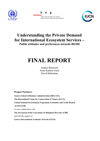Understanding Demand for International Payments for Ecosystem Services (IPES)
Small Grant
Keywords
Biodiversity - Conservation - International Payments for Ecosystem Services (IPES) - Payments for Ecosystem Services (PES)Summary
Although a recent policy tool, Payments for Ecosystem Services (PES) are considered by some to be "the most promising innovation since Rio 1992". While PES schemes are flourishing in many countries around the world - ranging from watershed to 'bioprospecting' deals - it appears as though the model has a limited applicability at the global level (the existing market for carbon credits stands out as an exception). Biodiversity loss is an international problem comparable to that of climate change in the scale of global change and the urgency required in finding ways to halt its continuation. However, it has yet to benefit from the innovative environmental policy tool of PES. It is thus important to explore the potential that an international PES scheme might have for supporting biodiversity conservation efforts around the world.
As climate concerns become increasingly present in public and private enterprises, there is a real opportunity for conservation and sustainability efforts to benefit from a growing environmental awareness in public and commercial spheres. The concept of 'reducing GHG emissions through avoided deforestation and forest degradation' (REDD) links forest conservation with climate concerns. This project will seek to identify how PES can channel the growing interest in the carbon market into conservation and sustainable land-use projects.
One specific project objective will include an analysis of the potential for scaling up PES to the international level and its potential as a tool for linking biodiversity protection and climate change issues. Secondly, in order to understand how IPES could potentially use awareness of climate change to tap into the demand for biodiversity, the attitudes and perceptions of private individuals driving the demand for functioning forest 'ecosystem services' need to be adequately assessed. The public willingness to pay for the preservation of ecosystems that have global significance is an essential component of this analysis. The primary research activity under this proposed project is a large-scale consumer survey to generate estimates of public willingness to pay for the preservation of forest ecosystems as part of carbon emission reduction activities. This survey will be conducted in Geneva, Switzerland and is envisaged by the project partners, UNEP, IUCN and HEG-GE, as a thorough pilot to a multi-country study to be conducted at a later date on the same topic.
PES and IPES is a fledgling policy research area - though it has gained an extraordinary ground in a relatively short time. This proposed study will contribute greatly to the wider discussions taking place in policy-making arenas on avoided deforestation and the development of PES as an international tool for achieving sustainable management of critical ecosystems.
The grant provided by the GIAN for this project totals SFr 50,000
Project Team
Mr Fulai Sheng , Coordinator, Economics and Trade Branch , Division of Technology, Industry, and Economics , United Nations Environment Programme (UNEP) .
Prof. Andrea Baranzini , Principal Member, High School of Management, Geneva .
Dr. Joshua Bishop , Principal Member, The World Conservation Union (IUCN) , World Conservation Union (IUCN) .
Prof. Emmanuel Fragnière , Principal Member, High School of Management, Geneva .
Ms Louise Gallagher , Principal Member, Economics and Trade Branch , Division of Technology, Industry, and Economics , United Nations Environment Programme (UNEP) .
Mr David Huberman , Principal Member, The World Conservation Union (IUCN) , World Conservation Union (IUCN) .
Dr. Markus Lehmann , Principal Member, Convention on Biological Biodiversity (CBD) .
Prof. Jean Tuberosa , Principal Member, High School of Management, Geneva .
Research Output
|
Understanding the Private Demand for International Ecosystem Services
(available in English only) > more |
